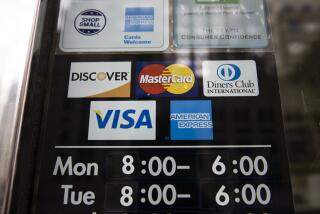GAO urges more transparency, fee changes for student debit cards
- Share via
The U.S. Government Accountability Office on Thursday urged more transparency in the debit card system used to electronically disburse college students’ financial aid, and said that transaction fees for the cards quickly add up.
In a report, the GAO said that the use of debit cards has risen over the last decade. Though only 11% of schools in the U.S. have contracts with companies to offer the debit cards, the 852 schools that do are disproportionately large, accounting for 40% of U.S. college enrollment, according to the GAO.
Congressional investigators said that though fees on the debit cards are comparable to conventional bank-issued cards, two large companies charge fees for purchases made using a personal identification number, or PIN. Those charges can quickly accumulate.
“No basic or student account that we reviewed for comparison purposes charged a transaction fee for using the account’s debit card,” the report said. The GAO said that about a third of all PIN transactions are for amounts less than $15, which can make a 50-cent fee an expensive addition relative to the amount of the transaction.
The report also urged the Department of Education to draw up requirements that would make agreements between colleges and card companies more transparent.
The GAO highlighted conflicts of interest that may exist when colleges provide information to students about debit card options.
“Schools may have incentives to influence student choice because some receive payments from card providers based on the number of card accounts or transactions, leading some consumer advocates to question whether schools always act in their students’ best interests,” the report said. “Furthermore, the contracts between schools and card providers are not publicly available and data on these cards are limited.”
The report said that while some schools have revenue-sharing agreements -- where the school receives a payment best on the number of accounts opened or other parameters -- the number of these arrangements appeared to be declining.
Colleges have opted to contract with companies to offer electronic options to disburse funds, the report said. The move often results in lower administrative costs associated with processing paper checks, which is partly why an increasing number of schools have moved toward these types of contracts.
One company, Higher One Holdings Inc., accounts for 57% of the college debit card market, congressional investigators said. Other financial firms that offer the services include U.S. Bank and Wells Fargo, but other competitors’ market share ranges from 2% to as much as 10%.
Higher One has seen tremendous growth in recent years. For 2012, the New Haven, Conn.-based company reported a profit of $36.9 million and has averaged annual net income growth of 37% over the previous three years, the GAO said. Nearly 80% of its 2012 revenue came from accounts opened by students and other college community members.
Higher One, which ended revenue-sharing agreements in 2007 and has sought to end those arrangements in existing contracts, said it has made “considerable changes to ensure our student account offerings are fair, valuable, fully transparent,” according to a statement from Casey McGuane, the company’s chief operating officer.
More to Read
Inside the business of entertainment
The Wide Shot brings you news, analysis and insights on everything from streaming wars to production — and what it all means for the future.
You may occasionally receive promotional content from the Los Angeles Times.











